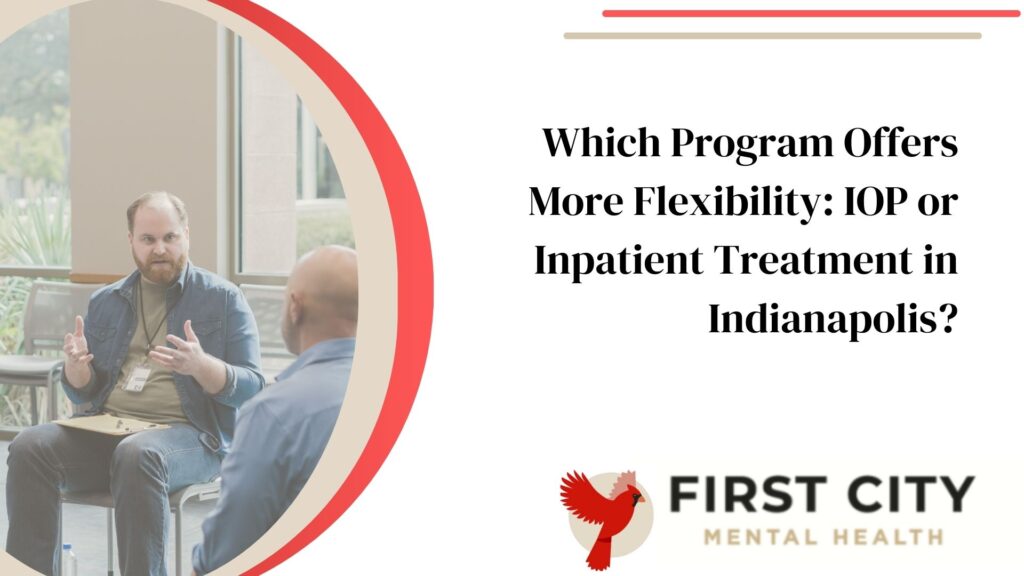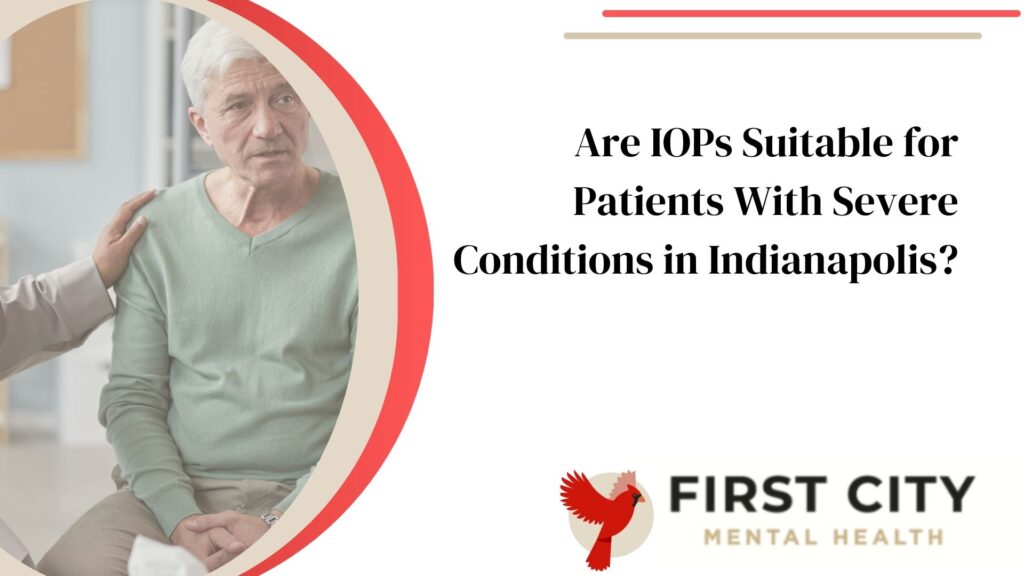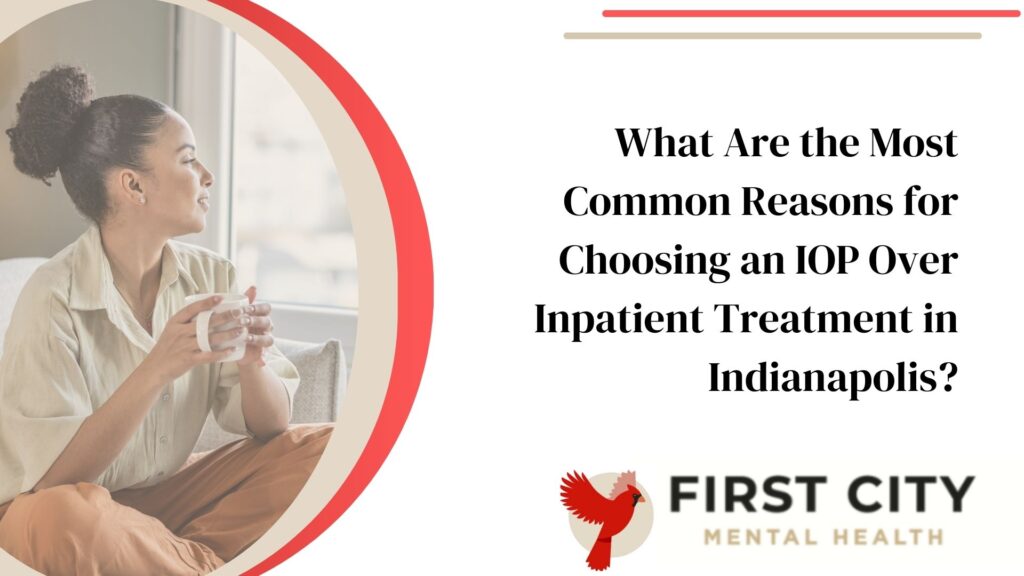
How Long Do Adult Intensive Outpatient Program Typically Last in Indianapolis?
January 14, 2025The Power of Partnership: Sycamore Behavioral Health Joins Forces with NAATP for Better Treatment Outcomes
January 15, 2025Choosing the right treatment for addiction or mental health issues can be hard. People often wonder about the best option for them. For those looking into IOP Indianapolis, understanding the difference between an intensive outpatient program (IOP) and inpatient treatment is key.
An IOP in Indianapolis offers a balance, providing support while letting patients stay at home.
An important fact to know is that an IOP typically lasts 30-35 days. It gives more help than regular therapy but less than living at a treatment center. This blog post will guide you through how IOPs differ from inpatient care in many ways, such as goals, flexibility, structure, and suitability for severe conditions.
Keep reading to discover which path could be right for you.
Key Takeaways
- Inpatient treatment offers round-the-clock assistance and necessitates a continuous stay at the healthcare center. This alternative is appropriate for individuals requiring concentrated aid, particularly during the initial detoxification stages.
- Therapy sessions in IOPs concentrate on integrating recovery strategies with everyday routines, delivering an adaptability not present in inpatient care. Participants take part in therapy sessions for a few hours each day, which does not interrupt their regular activities.
- Financial considerations are influential; IOPs are typically more affordable than inpatient options due to their outpatient nature. Individuals often opt for IOPs because of their economic efficiency and the possibility to manage personal duties while pursuing recovery.
How Do the Goals of IOPs and Inpatient Programs Differ in Indianapolis?
The main goal of Intensive Outpatient Program Indianapolis (IOPs) is to offer a high level of support for addiction problems while allowing individuals to maintain their daily lives.
These programs last about 30-35 days and serve as an intermediate step after partial hospitalization. They provide more structure than traditional therapy but don’t require staying at a facility overnight.
On the other hand, inpatient treatment programs aim for comprehensive care around the clock. People in these programs live at the facility, ensuring they receive constant support, especially during withdrawal phases.
While IOPs allow participants to go home each day, focusing on integrating treatment with everyday activities, inpatient care focuses on removing them from their regular environment to help break cycles of addiction.
This fundamental difference highlights how both options cater to different needs: IOPs work best for those who need serious intervention without disrupting their personal or professional commitments too much, whereas inpatient services are ideal for individuals requiring more intensive oversight and assistance through every hour of recovery.
Which Program Offers More Flexibility: IOP or Inpatient Treatment in Indianapolis?

For those looking at treatment options in Indianapolis, understanding the flexibility between programs is crucial. An Adult Intensive Outpatient Program in Indianapolis offers more adaptability compared to inpatient treatment.
Unlike living at a treatment facility as required by residential care, IOP allows individuals to live at home. This setup enables participants to maintain their daily routines including work or school while attending therapy sessions during the day or evening.
IOPs typically last 30-35 days and are designed for people who require structured care but not around-the-clock supervision.
IOPs provide both structure and freedom, allowing patients to integrate recovery with daily life.
This means that an adult intensive outpatient program gives the chance to balance personal responsibilities with the need for recovery support. In contrast, inpatient treatment demands a full-time commitment due to its 24-hour care environment, making it less flexible for those with commitments outside of rehabilitation.
How Does the Structure of an IOP Compare to Inpatient Treatment in Indianapolis?
The structure of an Adult Intensive Outpatient Program (IOP) in Indianapolis differs significantly from inpatient treatment. IOPs typically last 30 to 35 days, allowing individuals to receive structured care while living at home.
This setup enables participants to maintain their daily routines and responsibilities, providing a balance between support and independence.
In contrast, inpatient treatment requires patients to live at the facility for the duration of their program. It offers 24-hour care and closer monitoring, which is crucial during withdrawal periods.
While IOPs provide valuable therapy sessions and group activities, they do not match the high level of therapeutic care found in residential settings. Overall, both options cater to different needs regarding addiction recovery in Indianapolis.
How Many Hours Per Day Are Spent in an IOP Versus Inpatient Treatment in Indianapolis?
Understanding the time commitment for Intensive Outpatient Programs (IOP) and inpatient treatment in Indianapolis is crucial for making an informed decision. IOPs provide a structured approach to addiction recovery without the need for a residential stay. In contrast, inpatient treatment offers round-the-clock care within a treatment facility. Here’s a breakdown of the daily time investment for both options.
Treatment Type – Hours Per Day
Inpatient Treatment- 24 hours
Intensive Outpatient Program (IOP) – 3-4 hours
Inpatient treatment in Indianapolis requires a 24-hour commitment, providing constant support and care. This option is ideal for individuals needing a high level of support, especially during withdrawal. In contrast, IOPs in Indianapolis offer flexibility, requiring only 3-4 hours per day. This allows individuals to maintain their daily routines while receiving structured care for addiction problems. IOPs typically last 30-35 days, striking a balance between traditional therapy and the intensive care found in inpatient treatment, making it a suitable option for those who do not require 24-hour supervision but still need more support than traditional therapy.
Are IOPs Suitable for Patients With Severe Conditions in Indianapolis?

Intensive outpatient treatment programs (IOPs) in Indianapolis can suit some patients with severe conditions. These programs provide structured care for addiction while allowing individuals to live at home.
IOPs offer more support than traditional therapy but less than inpatient treatment. Patients who do not require 24-hour care may benefit from an IOP.
However, those facing intense withdrawal or extreme crises might need inpatient treatment’s greater support. Inpatient facilities provide 24-hour care, helping manage severe symptoms effectively.
Patients should assess their needs carefully before deciding between an IOP and inpatient options. Each person’s situation is unique, so it’s essential to find the right fit for recovery goals.
How Do Therapy Sessions in IOPs Differ From Those in Inpatient Programs in Indianapolis?
Therapy sessions in IOPs differ significantly from those in inpatient programs. In Indianapolis, IOPs typically focus on structured care while allowing individuals to maintain their daily routines.
Participants attend multiple sessions each week but return home after treatment. This setup offers flexibility that inpatient programs cannot provide.
Inpatient treatment involves living at the facility and participating in 24-hour care. Therapists deliver intensive support during this time, catering to severe conditions such as withdrawal symptoms.
While both programs aim for recovery, IOP Indiana concentrates more on helping clients integrate into everyday life while still receiving therapeutic guidance.
How Do Indianapolis IOPs Prepare Participants for Long-Term Recovery Compared to Inpatient Care?
IOP in Indianapolis focuses on providing structured care for addiction while allowing individuals to maintain their daily routines. These programs last 30-35 days, giving participants essential support that surpasses traditional therapy but is less intensive than inpatient treatment.
Participants engage in multiple therapy sessions each week, which encourages them to apply coping skills in real-life situations. This hands-on approach helps build resilience and prepares individuals for long-term recovery.
In contrast, inpatient treatment offers round-the-clock support during withdrawal, creating a safe environment for those who need intensive help. While this level of care is beneficial, it does not provide the same opportunities for practicing life skills outside the controlled setting of a facility.
Therefore, Indianapolis IOPs serve as an excellent option for individuals seeking more flexibility and independence as they work toward recovery goals.
What Are the Most Common Reasons for Choosing an IOP Over Inpatient Treatment in Indianapolis?

Indianapolis offers various treatment options for those struggling with addiction. Individuals often prefer an Intensive Outpatient Indiana Program (IOP) over inpatient treatment for several specific reasons.
- Flexibility: IOPs provide more flexibility than inpatient programs. Participants can maintain their daily routines while attending structured sessions, which is ideal for those balancing work or family commitments.
- Shorter Duration: An IOP in Indianapolis typically lasts 30-35 days. This shorter commitment appeals to individuals who may feel overwhelmed by the longer stay required in inpatient programs.
- Cost-Effectiveness: IOPs usually cost less than inpatient treatment. Individuals can access quality care without incurring the higher expenses associated with residential facilities.
- Focus on Therapy: An intensive outpatient program emphasizes therapeutic activities while allowing participants to live at home. This approach helps them apply skills learned in therapy to real-life situations immediately.
- Support for Mild Conditions: IOPs suit individuals who do not require 24-hour monitoring due to severe withdrawal symptoms. Those seeking help often find this option fits their needs perfectly.
- Structured Care: IOPs in Indianapolis deliver structured care specifically for addiction issues. Participants receive consistent support while continuing their everyday responsibilities.
- Social Support Systems: Enrolling in an IOP allows patients to engage with their existing support systems like family and friends during recovery stages, enhancing overall emotional health as they adjust back into daily life.
- Step Down from PHP: Many choose an IOP as the next step after completing a Partial Hospitalization Program (PHP). This transition provides continued support without overwhelming patients.
- Therapy Variety: The therapy sessions in an IOP feature diverse approaches such as group and individual counseling, ensuring treatments meet varying needs effectively compared with inpatient options that may focus heavily on one method.
- Preparation for Long-Term Recovery: An IOP prepares participants more gradually for long-term recovery compared to inpatient care, focusing on coping strategies and life skills essential for sustained sobriety after leaving treatment.
Conclusion
Understanding the differences between IOP Indianapolis and inpatient treatment is crucial. Both options serve distinct needs in recovery. IOP offers flexibility, allowing patients to maintain their daily routines while still receiving support.
In contrast, inpatient care provides constant supervision and intensive help for severe conditions. Each method has its place in a comprehensive treatment plan. Explore these options to find what suits you best and take the next step toward lasting recovery.
FAQs
What is an IOP in Indianapolis?
An Intensive Outpatient Program (IOP) in Indianapolis refers to a specialized treatment program that allows individuals to receive intensive therapy while living at home and maintaining their regular daily activities.
How does an adult IOP in Indiana differ from inpatient treatment?
While both offer comprehensive care, the main difference lies in the level of commitment. Inpatient treatment requires full-time residency at a facility, whereas an adult IOP in Indianapolis provides flexible schedules, allowing individuals to continue with work or school during treatment.
Are all IOP programs in Indianapolis similar?
Not necessarily. The structure and intensity may vary across different IOP programs within Indianapolis based on individual needs and recovery progress.
Why might someone choose an intensive outpatient treatment program over traditional methods?
The advantage of choosing an Intensive Outpatient Treatment Program like those found throughout Indiana is the balance it offers between effective therapeutic intervention and personal freedom, making it ideal for those who need support but also want to maintain their everyday life commitments.






